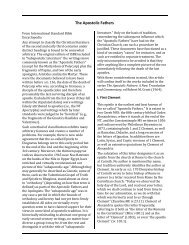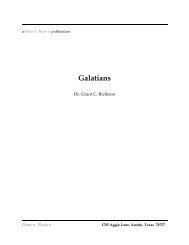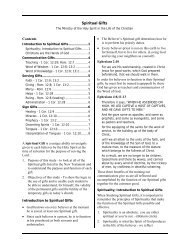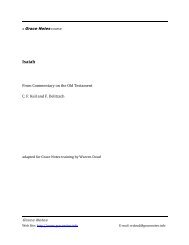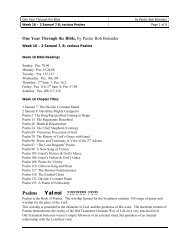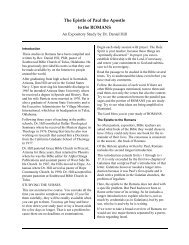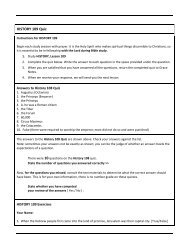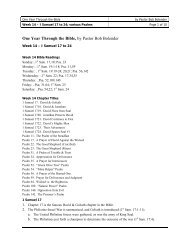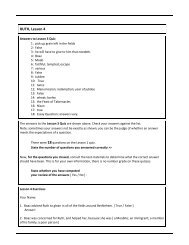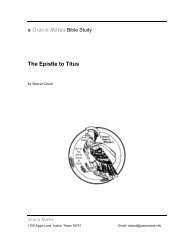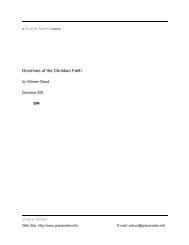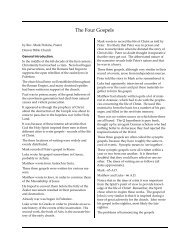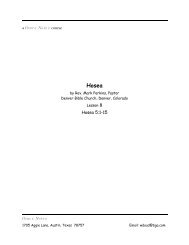Song of Solomon - Grace Notes
Song of Solomon - Grace Notes
Song of Solomon - Grace Notes
Create successful ePaper yourself
Turn your PDF publications into a flip-book with our unique Google optimized e-Paper software.
SONG OF SOLOMON Page 19By C. F. Keil and F. Delitzscha <strong>Grace</strong> <strong>Notes</strong> study(for). We prefer, with Böttch., the former,because in the latter case we would have hadsignifies, שְׁ חַ רְׁ חֹרֶּ ת The quinqueliterum .שהשמשin contradistinction to חור ,שָ that which is blackhere and there, and thus not altogether black.This form, as descriptive <strong>of</strong> colour, isdiminutive; but since it also means id quodpassim est, if the accent lies on passim, asdistinguished from raro, it can be also taken as,יְׁפֵ יפָ ה increasing instead <strong>of</strong> diminishing, as in(Symm. The LXX trans. π έ λεψέ .הֲ פַ כְׁ פַ ְךπ έ λεψέ) ε ὁ ἥλ ς: the sun has lookedaskance on me. But why only askance? TheVenet. better: ε έ ε; but that is too little.The look is thought <strong>of</strong> as scorching; whereforeAquila: συ έ υσέ ε, it has burnt me; andTheodotion: πε έφ υξέ ε, it has scorched meover and over. שָ זַ ף signifies here not adspicere(Job 3:9; 41:10) so much as adurere. In thisword itself (cogn. דַ ף ;שָ Arab. sadaf, whenceasdaf, black; cf. דָ עַ ְך and עַ ְך ,זָ Job 17:1), thelooking is thought <strong>of</strong> as a scorching; for the rays<strong>of</strong> the eye, when they fix upon anything, gatherthemselves, as it were, into a focus. Besides, asthe Scriptures ascribe twinkling to the morningdawn, so it ascribes eyes to the sun (2 Sam.12:11), which is itself as the eye <strong>of</strong> the heavens.The poet delicately represents Shulamith asregarding the sun as fem. Its name in Arab. andold Germ. is fem., in Heb. and Aram. for themost part mas. My lady the sun, she, as it were,says, has produced on her this swarthiness.She now says how it has happened that she isthus sunburnt:6b My mother’s sons were angry with me,Appointed me as keeper <strong>of</strong> the vineyards—Mine own vineyard have I not kept.If “mother’s sons” is the parallel for “brothers”then the expressions are <strong>of</strong> the same ,(אַ חַ י)import, e.g., Gen. 27:29; but if the twoexpressions stand in apposition, as Deut. 13:7[6], then the idea <strong>of</strong> the natural brother issharpened; but when “mother’s sons” standsthus by itself alone, then, after Lev. 18:9, itmeans the relationship by one <strong>of</strong> the parentsalone, as “father’s wife” in the language <strong>of</strong> theO.T. and also 1 Cor. 5:5 is the designation <strong>of</strong> astep-mother. Nowhere is mention made <strong>of</strong>Shulamith’s father, but always, as here, only <strong>of</strong>her mother, 3:4; 8:2; 6:9; and she is only namedwithout being introduced as speaking. One isled to suppose that Shulamith’s own father wasdead, and that her mother had been marriedagain; the sons by the second marriage werethey who ruled in the house <strong>of</strong> their mother.These brothers <strong>of</strong> Shulamith appear towardsthe end <strong>of</strong> the melodrama as rigorous guardians<strong>of</strong> their youthful sister; one will thus have tosuppose that their zeal for the spotless honour<strong>of</strong> their sister and the family proceeded from anendeavour to accustom the fickle or dreamingchild to useful activity, but not without stepbrotherlyharshness. The form חֲ רּו ,נִ Ewald, §193c, and Olsh. p. 593, derive from רַ ר ,חָ the,(נִ חְׁ רַ ר =) נִ חַ ר or נָ חַ ר Niph. <strong>of</strong> which is eitherנִ חַ ר Gesen. § 68, An. 5; but the plur. <strong>of</strong> thisshould, according to rule, have been נִ חָ רּו (cf.however, חֲ לּו ,נַ pr<strong>of</strong>anantur, Ezek. 7:24); andחַ רָ ר from נִ חַ ר what is more decisive, thiseverywhere else expresses a different passionחָ רָ ה 379). (2, 1060 § Böttch. from that <strong>of</strong> anger;נִ חֲ רּו is used <strong>of</strong> the burning <strong>of</strong> anger; and that,נֶּ חֱ רּו can be another form for (נִ חְׁ רָ ה = נֶּ חֱ רָ ה (fromis shown, e.g., by the interchange <strong>of</strong> אֶּ חֱ רּו andAmos ,6:6 resisted ,נֶּ חְׁ לּו like ,נֶּ חְׁ רּו the form ;אִ חֲ רּוthe bringing together <strong>of</strong> the ח and the halfguttural .ר Nĕhĕrā (here as Isa. 41:11; 45:24)means, according to the original, mid. signif. <strong>of</strong>the Niph., to burn inwardly, φλέγεσθ =ὀ γίζεσθ . Shulamith’s address consistsintentionally <strong>of</strong> clauses with perfects placedtogether: she speaks with childlike artlessness,and not “like a book;” in the language <strong>of</strong> a book,.שָ מֻ נִי would have been used instead <strong>of</strong> וַ יְׁשִ מּונִיBut that she uses נֹטֵ רָ ה (from ,נטר R. טר = η ε ;cf. Targ. Gen. 37:11 with Luke 2:51), and not



